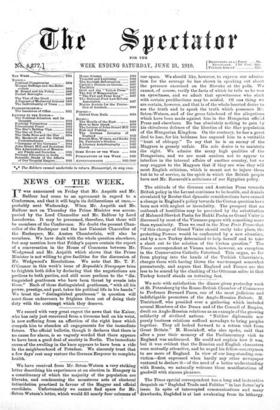We have received from Mr. Seton-Watson a very striking letter
describing his experiences at an election in Hungary in a constituency of which the majority of the population are Slovaks, and condemning the monstrous acts of electoral intimidation practised in favour of the Magyar and official candidate. Unfortunately we cannot find space for Mr. ,Seton-Watson's letter, 'which would fill nearly-four columns'of
our space. We should like, however, to express our admira- tion for the courage he has shown in speaking out about the pressure exercised on the Slovaks at the polls. We cannot, of course, verify the facts of which he tells us he was an eyewitness, and we admit that eyewitnesses who start with certain predilections may be misled. Of one thing we are certain, however, and that is of the whole-hearted desire to see the truth and to speak the truth which possesses Mr. Seton-Watson, and of the gross falsehood of the allegations which have been made against him in the Hungarian official Press and elsewhere. He has absolutely nothing to gain by his chivalrous defence of the liberties of the Slav population of the Hungarian Kingdom. On the contrary, he has a great deal to lose, for his boldness has exposed him to a veritable "hunt of obloquy." To say that he is an enemy of the Magyars is grossly unfair. His sole desire is to maintain the right. We admire the many high qualities of the Hungarians, and we are most anxious not to appear to interfere in the internal affairs of another country, but we may_ suggest to the Magyars that if they arc wise they will meet English criticism, which is meant not to injure them but to be of service, in the spirit in which the British people have met Mr. Roosevelt's criticisms of our Egyptian policy.










































